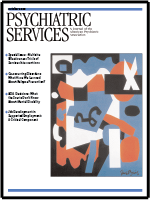2004 Survey Finds Decline in Illicit Drug Use Among Youths
The use of illicit drugs among youths aged 12 to 17 years declined by 9 percent between 2002 and 2004. Marijuana continues to be the most commonly used illicit drug, and rates of use in the 18- to 24-year age group declined by 7 percent over the same period. These estimates are based on data from the 2004 National Survey on Drug Use and Health, which was released in September by the Substance Abuse and Mental Health Services Administration (SAMHSA).
Since 1971 the annual survey has collected data by administering questionnaires to persons aged 12 and older through face-to-face interviews at participants' places of residence. Most of the questions are administered via audio computer-assisted self-interviewing, which provides interviewees with a highly private and confidential means of responding. Between January and December of 2004 a total of 67,760 completed interviews were obtained.
The survey found that 19.1 million Americans, or 7.9 percent of the population aged 12 and older, used an illicit drug in the past month (current use). This rate was similar to the 2002 and 2003 rates—8.3 and 8.2 percent, respectively. A total of 14.6 million Americans (6.1 percent) were current marijuana users. An estimated 8.2 million people (3.4 percent of the population) were current users of illicit drugs other than marijuana. Most (6 million, or 2.5 percent of the population) used psychotherapeutic drugs nonmedically—an estimated 4.4 million used narcotic pain relievers, 1.6 million used tranquilizers, 1.2 million used stimulants (including 583,000 methamphetamine users), and .3 million used sedatives. The number of heroin users was estimated at 166,000. These rates are all similar to the corresponding estimates for 2003.
The 2004 survey also found that 121 million Americans, or 50.3 percent of those aged 12 and older, were current drinkers of alcohol. More than one-fifth of Americans (55 million persons, or 22.8 percent) participated in past-month binge drinking, defined as five or more drinks on at least one occasion, and 16.7 million (6.9 percent) were heavy drinkers, defined as binge drinking on five or more days in the past month. These rates are similar to the 2002 and 2003 rates.
The 2004 rate of underage drinking remained the same as in 2002 and 2003. About 10.8 million persons aged 12 to 20 (28.7 percent of this age group) were current drinkers. A total of 32.5 million persons (13.5 percent of the population) drove under the influence of alcohol at least once in the previous 12 months, a rate similar to the 2003 rate.
The 2004 survey also found that 70.3 million Americans, or 29.2 percent of the population, were current users of a tobacco product: 59.9 million (24.9 percent) smoked cigarettes, 13.7 million (5.7 percent) smoked cigars, 7.2 million (3 percent) used smokeless tobacco, and 1.8 million (.8 percent) smoked tobacco in pipes. The rate of tobacco use declined between 2002 and 2004, from 30.4 to 29.2 percent, due primarily to a decline in cigarette use from 26.0 to 24.9 percent. Young adults aged 18 to 25 continued to have the highest rate of past-month cigarette use (39.5 percent). The rate did not change significantly between 2002 and 2004. The rate of cigarette use among youths aged 12 to 17 declined from 13 percent in 2002 to 11.9 percent in 2004.
In 2004 a total of 23.4 million (9.8 percent of the population) needed treatment for an alcohol or drug use problem. Of these, 2.3 million received treatment at a specialty facility in the past year, including 1.7 million at a rehabilitation facility as an outpatient, 947,000 at a rehabilitation facility as an inpatient, 775,000 at a hospital as an inpatient, and 982,000 at a mental health center as an outpatient. Thus about 21 million people needed but did not receive treatment.
The results of the 2004 survey are available on the Web site of SAMHSA's office of applied studies at www.oas.samhsa.gov.

